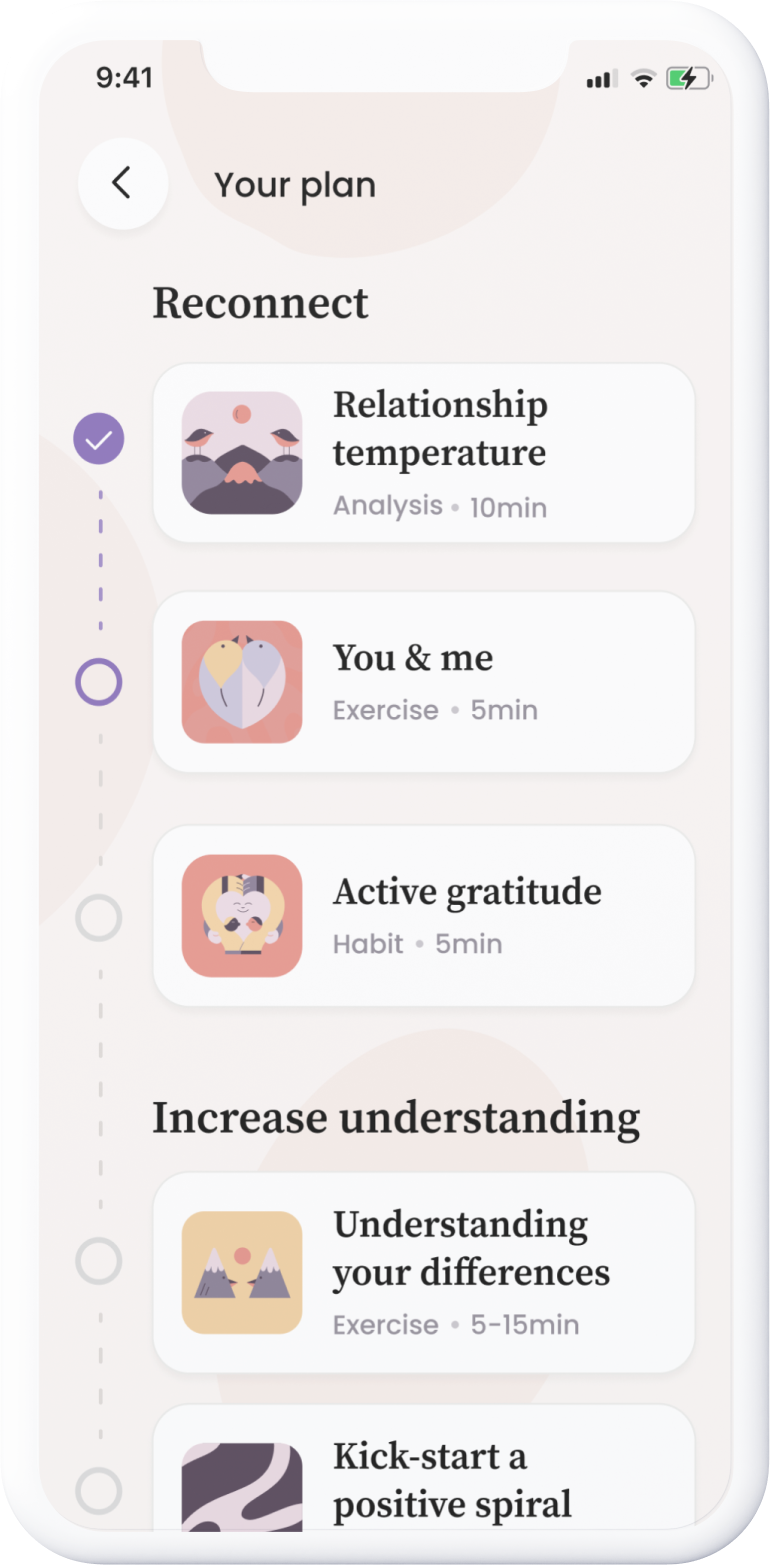Are You or Your Partner Jealous?
Jealousy and insecurity in relationships- 19 September 2023
- 8min

Jealousy within a relationship refers to the uncomfortable emotion that arises from the fear that someone else might replace us as our partner's nearest and dearest.
The mere thought of someone else capturing our partner's attention and affection can cause discomfort for most of us. But when does this discomfort escalate into full-blown jealousy?
We aim to shed light on what jealousy truly entails and explore ways to manage it, both if you find yourself grappling with jealousy and if your partner exhibits possessive tendencies.
What is jealousy?
When you experience jealousy, you often notice the physical manifestations of this emotion in your body. Much like the physical response to severe stress, your body's alarm system kicks in. Perhaps you feel a sense of panic.
Alongside these bodily sensations, thoughts and even mental images often emerge. These thoughts and images usually revolve around the fear of rejection.
You might think, "What if they're falling for a coworker?" or "What if they meet someone they like more at the party?" These thoughts may even manifest as mental images of your partner kissing a mutual friend.
Why do we feel jealous?
The fear that a romantic relationship might come to an end is a natural part of entering into such a partnership. A certain degree of jealousy is thus entirely normal, particularly in the early stages of a relationship.
However, if we allow these feelings to dictate our actions too frequently, it can become destructive. For some, intrusive thoughts and emotions can become overwhelming, consuming so much time and energy that it becomes challenging to appreciate the positives in the relationship. This is when jealousy transitions into a problem.
Different facets of jealousy
Jealousy can manifest in various forms. In this post, we focus on jealousy within romantic relationships, although it can also appear in other types of relationships. Some individuals who experience jealousy may have past experiences of betrayal or deception in relationships.
Jealousy can have an emotional focus, involving the fear that someone else will receive your partner's love and attention. Alternatively, it may center on the sexual aspects of a relationship, encompassing the fear of your partner becoming physically intimate with someone else.
Retroactive jealousy is centered on events from the past. You might find yourself obsessing over your partner's past relationships or sexual experiences. Perhaps you compare yourself to your partner's ex or doubt whether you'll ever be loved or desired as much as a previous partner.
When does jealousy become a relationship issue?
When we frequently ruminate on thoughts of our partner leaving us, being unfaithful, or the relationship being in jeopardy, it can start to affect our behavior.
We may ask more questions, not merely out of curiosity but to reassure ourselves that everything is alright. For instance, "Who are you texting?" or "Who are you going out with?" These questions serve to put our minds at ease, such as when we breathe a sigh of relief after confirming it was just a text to a sibling.
Perhaps we send more text messages than usual when our partner is out alone or engage in a sort of mini-interrogation upon their return.
The temptation to seek control
When jealousy strikes, it's tempting to seek a sense of control or certainty to dispel those worrisome thoughts. And since this sense of control provides momentary relief when we attain it, we often continue to pursue it.
Yet, these control-seeking behaviors only perpetuate the sense of potential threat, not to mention their other negative impacts on the relationship. They have no place in a healthy, trusting partnership.
Watch out for the following controlling behaviors:
- Detailed questioning, such as "Where have you been?" "Who were you with?" "What did you do?" and so on.
- Going through your partner's phone, which includes reading texts, emails, or social media chats, checking the address book, or looking at pictures.
- Repeatedly demanding assurance that your partner doesn't love anyone else.
Can jealousy ever be justified? Yes, there are situations where jealousy can be a justified response to actual rejection or betrayal. If there's a history of infidelity or if infidelity occurred in prior relationships, it's not surprising to feel more jealous.
If either of you has been unfaithful in your current relationship, it's particularly important to recognize that feelings of jealousy can arise in the betrayed person. The other partner may require extra reassurance over a period to rebuild trust.
Are you the one feeling jealous? Understand it better!
When attempting to comprehend your own jealousy, search for patterns from your past. You may be more susceptible to jealousy if you've experienced a lack of trust in your earlier life.
Perhaps significant adults were not consistently present, or you witnessed infidelity or betrayal by your parents. Low self-esteem or a general inclination toward anxiety or difficulty handling uncertainty can also contribute.
If you typically don't experience jealousy but find yourself becoming jealous due to new behaviors exhibited by your partner, such as hiding things, it's crucial to address it and communicate your feelings. Share the specific thoughts and emotions you're grappling with, even if you don't receive answers that immediately resolve the issue.
Tips for managing jealousy (when you are the jealous one):
In a way, insecurity and uncertainty about the longevity of a relationship are inherent to love. You must develop strategies for managing this uncertainty that don't involve controlling your partner. Remember that, as uncomfortable as feelings may be, they often diminish over time, even without your intervention.
- Resist all forms of partner control. Avoid seeking assurances, interrogating your partner about their interactions, or snooping through their messages.
- Take a deep breath, observe your thoughts and feelings, and remind yourself that thoughts and feelings are just that – thoughts and feelings, not necessarily truths. Find ways to calm yourself independently, such as going for a walk or engaging in an enjoyable activity.
- Understand your jealousy better by reflecting on situations that typically trigger it. Examine the thoughts and emotions these situations evoke and identify behaviors you need to refrain from acting upon.
Tips for managing a jealous partner
If your partner frequently questions you or engages in controlling or possessive behaviors, do not acquiesce. We understand this can be challenging because a relationship involves caring for each other, demonstrating trust, and compromising when necessary. However, if you continually placate your partner by managing their feelings related to jealousy, it can exacerbate the issue.
Remember that your reassurances provide temporary relief for your partner. While it's important to demonstrate your reliability and support, your partner needs to learn how to manage their own feelings of jealousy. Encourage your partner to seek professional help if it doesn't improve over time.








